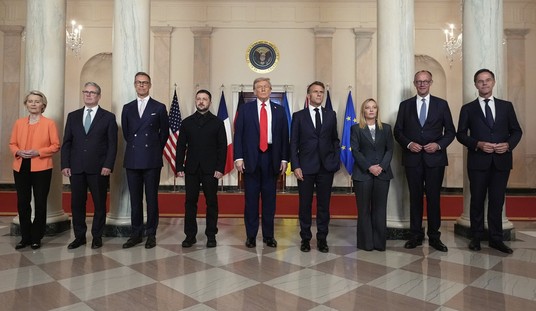Want to see what the next two years will look like within the Republican Party? Spend a few minutes watching this painful scene between two people who largely agree with each other over who’s to blame for what is likely to come in less than three weeks. Bill Kristol and Joe Scarborough, along with Mika Brzezinski, go toe to toe over whether Morning Joe gave Trump a free ride in 2015, although the actual issue in question is whether Republican leaders should disavow Trump now — which both of them want.
Either pop the popcorn or pour the hemlock, depending on your point of view:
https://www.youtube.com/watch?v=yAFNHYEcy4M
SCARBOROUGH: I can’t even believe you’re doing this. I don’t know why you’re so bitter.
KRISTOL: I’m not bitter. I’m trying to say the Republican nominee —
SCARBOROUGH: You’re practically crying! You’re practically crying!
KRISTOL: I am upset about this election. That’s right, Joe. ‘Cuz you think it’s amusing that Donald Trump is the nominee.
Callum Borchers notes that both of them are actually correct on the show’s treatment of Trump. Early on, Trump had plenty of friendly conversations over the phone with the co-hosts, but that wasn’t the only friendly media venue for Trump in 2015. Borchers links to an Erik Wemple critique in February of a town-hall event the pair hosted, calling it “a puff session,” to which Scarborough took exception at the time. But as a Shorenstein Center study demonstrated, Trump got a lot of positive press and $55 million in free media exposure in the year before the start of the primaries, far more than any of his Republican challengers, so it certainly wasn’t Morning Joe alone that had that problem. After that, though, Scarborough and Brzezinski became very tough on Trump, so much so that Trump touched off a personal feud with both hosts.
We can expect to see plenty of this kind of argument after the election if Trump loses (still an if, by the way) — who stood against him and when, who legitimized him and when, and so on. All of it will miss the point. Trump gained traction among Republican voters long before any party leaders endorsed him, and as I write in my column at The Fiscal Times, Republican elected officials can look in the mirror to see who gets the blame for that:
That disconnect began long before the Tea Party-driven midterm waves of 2010 and 2014. Its roots go back to the four-year period of Republican control of Washington in 2002-2006. After a bruising several years of divided government, the GOP promised its voters that single-party control would deliver on pledges to reduce government, shrink the regulatory state, and deal with the national debt. Instead, Republicans focused more on splitting the spoils with an ill-advised “K Street Project” to curry favor with lobbyists, and waste an opportunity to settle immigration and health-care reform efforts on conservative principles.
The Tea Party revolt in 2010 gave Republicans a chance to block Barack Obama’s radical agenda, at which the GOP House majority largely succeeded. After failing to win the White House in 2012, however, Republicans overpromised what a 2014 midterm win could deliver. As a result, they set themselves up for failure: A budget filibuster unsurprisingly failed to convince President Obama to repeal his own Obamacare law, and Congress had to compromise on other budget items to garner Obama’s signature – even though anyone with a basic education in civics could have predicted both outcomes.
But that’s only part of the problem. Republicans have gotten trapped into defending the interests of a narrow band of the wealthy rather than focus on the real concerns and decline of working-class Americans. In 2008, the financial-sector meltdown had Republicans grudgingly arguing for the bailout of “too big to fail” bankers. In 2012, Mitt Romney dismissed the “47 percent” while the GOP tried to defend venture capital operations – certainly defensible, but hardly an issue to which most voters relate.
Small wonder that Trump struck a chord with working-class Americans in the GOP primaries when he ripped free trade deals for their impact on jobs and communities. Had Republicans made those issues the centerpiece of their economic initiatives while they had the chance in 2002-6, or even in the last four years of partial or complete control of Congress, they might have had a very different nominee in place now – and could have looked at a very different outcome in three weeks.
Going after Paul Ryan and Mitch McConnell for offering pro forma endorsements to the party’s nominee after voters made that decision is a waste of time. If Republicans and conservatives want to put a potential Trump loss behind them, they’d be much better off listening to the voters that nominated him and offering real solutions to their problems rather than the ideological warfare that has consumed the party, and which voters clearly rejected with their choice of Trump.
Update: Joe Scarborough responds well on Twitter:
Many are reaching out about the @BillKristol segment. Here's the deal. Bill and I disagree sometimes but we are always friends.
— Joe Scarborough (@JoeNBC) October 20, 2016
Here's another thing about @BillKristol and me. We are on the same team.
We are Americans who love our country even when we disagree.— Joe Scarborough (@JoeNBC) October 20, 2016
We’ll need to remember that after this election.









Join the conversation as a VIP Member